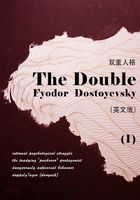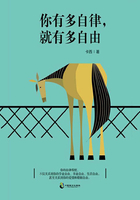Until they left Perm Nekhludoff only twice managed to see Katusha, once in Nijni, before the prisoners were embarked on a barge surrounded with a wire netting, and again in Perm in the prison office. At both these interviews he found her reserved and unkind. She answered his questions as to whether she was in want of anything, and whether she was comfortable, evasively and bashfully, and, as he thought, with the same feeling of hostile reproach which she had shown several times before. Her depressed state of mind, which was only the result of the molestations from the men that she was undergoing at the time, tormented Nekhludoff. He feared lest, influenced by the hard and degrading circumstances in which she was placed on the journey, she should again get into that state of despair and discord with her own self which formerly made her irritable with him, and which had caused her to drink and smoke excessively to gain oblivion. But he was unable to help her in any way during this part of the journey, as it was impossible for him to be with her. It was only when she joined the political prisoners that he saw how unfounded his fears were, and at each interview he noticed that inner change he so strongly desired to see in her becoming more and more marked. The first time they met in Tomsk she was again just as she had been when leaving Moscow. She did not frown or become confused when she saw him, but met him joyfully and simply, thanking him for what he had done for her, especially for bringing her among the people with whom she now was.
After two months' marching with the gang, the change that had taken place within her became noticeable in her appearance. She grew sunburned and thinner, and seemed older; wrinkles appeared on her temples and round her mouth. She had no ringlets on her forehead now, and her hair was covered with the kerchief; in the way it was arranged, as well as in her dress and her manners, there was no trace of coquetry left. And this change, which had taken place and was still progressing in her, made Nekhludoff very happy.
He felt for her something he had never experienced before. This feeling had nothing in common with his first poetic love for her, and even less with the sensual love that had followed, nor even with the satisfaction of a duty fulfilled, not unmixed with self-admiration, with which he decided to marry her after the trial. The present feeling was simply one of pity and tenderness. He had felt it when he met her in prison for the first time, and then again when, after conquering his repugnance, he forgave her the imagined intrigue with the medical assistant in the hospital (the injustice done her had since been discovered); it was the same feeling he now had, only with this difference, that formerly it was momentary, and that now it had become permanent. Whatever he was doing, whatever he was thinking now, a feeling of pity and tenderness dwelt with him, and not only pity and tenderness for her, but for everybody. This feeling seemed to have opened the floodgates of love, which had found no outlet in Nekhludoff's soul, and the love now flowed out to every one he met.
During this journey Nekhludoff's feelings were so stimulated that he could not help being attentive and considerate to everybody, from the coachman and the convoy soldiers to the prison inspectors and governors whom he had to deal with. Now that Maslova was among the political prisoners, Nekhludoff could not help becoming acquainted with many of them, first in Ekaterinburg, where they had a good deal of freedom and were kept altogether in a large cell, and then on the road when Maslova was marching with three of the men and four of the women. Coming in contact with political exiles in this way made Nekhludoff completely change his mind concerning them.
From the very beginning of the revolutionary movement in Russia, but especially since that first of March, when Alexander II was murdered, Nekhludoff regarded the revolutionists with dislike and contempt. He was repulsed by the cruelty and secrecy of the methods they employed in their struggles against the government, especially the cruel murders they committed, and their arrogance also disgusted him. But having learned more intimately to know them and all they had suffered at the hands of the government, he saw that they could not be other than they were.
Terrible and endless as were the torments which were inflicted on the criminals, there was at least some semblance of justice shown them before and after they were sentenced, but in the case of the political prisoners there was not even that semblance, as Nekhludoff saw in the case of Sholostova and that of many and many of his new acquaintances. These people were dealt with like fish caught with a net; everything that gets into the nets is pulled ashore, and then the big fish which are required are sorted out and the little ones are left to perish unheeded on the shore. Having captured hundreds that were evidently guiltless, and that could not be dangerous to the government, they left them imprisoned for years, where they became consumptive, went out of their minds or committed suicide, and kept them only because they had no inducement to set them free, while they might be of use to elucidate some question at a judicial inquiry, safe in prison. The fate of these persons, often innocent even from the government point of view, depended on the whim, the humour of, or the amount of leisure at the disposal of some police officer or spy, or public prosecutor, or magistrate, or governor, or minister. Some one of these officials feels dull, or inclined to distinguish himself, and makes a number of arrests, and imprisons or sets free, according to his own fancy or that of the higher authorities. And the higher official, actuated by like motives, according to whether he is inclined to distinguish himself, or to what his relations to the minister are, exiles men to the other side of the world or keeps them in solitary confinement, condemns them to Siberia, to hard labour, to death, or sets them free at the request of some lady.
They were dealt with as in war, and they naturally employed the means that were used against them. And as the military men live in an atmosphere of public opinion that not only conceals from them the guilt of their actions, but sets these actions up as feats of heroism, so these political offenders were also constantly surrounded by an atmosphere of public opinion which made the cruel actions they committed, in the face of danger and at the risk of liberty and life, and all that is dear to men, seem not wicked but glorious actions. Nekhludoff found in this the explanation of the surprising phenomenon that men, with the mildest characters, who seemed incapable of witnessing the sufferings of any living creature, much less of inflicting pain, quietly prepared to murder men, nearly all of them considering murder lawful and just on certain occasions as a means for self-defence, for the attainment of higher aims or for the general welfare.
The importance they attribute to their cause, and consequently to themselves, flowed naturally from the importance the government attached to their actions, and the cruelty of the punishments it inflicted on them. When Nekhludoff came to know them better he became convinced that they were not the right-down villains that some imagined them to be, nor the complete heroes that others thought them, but ordinary people, just the same as others, among whom there were some good and some bad, and some mediocre, as there are everywhere.
There were some among them who had turned revolutionists because they honestly considered it their duty to fight the existing evils, but there were also those who chose this work for selfish, ambitious motives; the majority, however, was attracted to the revolutionary idea by the desire for danger, for risks, the enjoyment of playing with one's life, which, as Nekhludoff knew from his military experiences, is quite common to the most ordinary people while they are young and full of energy. But wherein they differed from ordinary people was that their moral standard was a higher one than that of ordinary men. They considered not only self-control, hard living, truthfulness, but also the readiness to sacrifice everything, even life, for the common welfare as their duty. Therefore the best among them stood on a moral level that is not often reached, while the worst were far below the ordinary level, many of them being untruthful, hypocritical and at the same time self-satisfied and proud. So that Nekhludoff learned not only to respect but to love some of his new acquaintances, while he remained more than indifferent to others.














